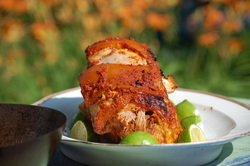 My recent trip to New Jersey was highlighted by a discussion about extreme diets. At first, I did not want to get in the middle, but my friend sent to me an interview with Lierre Keith, the author of “The Vegetarian Myth” who became an omnivore after over 20 years on a vegan diet. After listening to this interview I felt this would be the right time for me to chime in. First of all, either extreme (eating a lot of meat or being completely vegan) is unhealthy. Most people who follow extreme diets tend to do this for some bizarre reason usually related to a belief or a negative experience in life, none of which have to do with the actual physiology of digestion and absorption. Lierre Keith seems to fall into this category. I have not read the book, but from her interview I conclude that she does not have a solid grip of science (specifically biochemistry). With this little knowledge she is attempting to explain biological processes. For example, she claims that our brain cannot be fed a vegetarian diet because this diet is 'full of sugar'. This is simply not true! The only nutrient our brain CAN use is glucose (aka carbohydrate), so eating carbohydrate (CHO) as is would be the fastest way to feed the brain. This could be a donut (simple carbohydrate) or a piece of whole wheat bread, a vegetable, or a fruit (complex carbohydrate). Unfortunately, as good as they taste simple carbohydrates are considered 'empty calories', meaning there is no nutrition value in them (no vitamins), but there is no question they will be good for your brain. Other macronutrients such as proteins and fats will be converted to glucose in the liver. However, the process of absorption will take longer than carbohydrates. The liver is our major organ doing practically all dirty work such as detox (drugs and alcohol breakdown), de-aminating proteins (amino acids are very toxic and have to be diluted with water, and eliminated in urine), and breaking down long- and short- chains of fatty acids, so they can be converted into glucose. This glucose will be then used by the brain, muscles, or stored in adipose tissue for future use. YES, our survival mechanism is amazing and we can live at least 3 months on our fat and muscle storage (eventually our body will start breaking down muscle if fat is not available) as long as we have enough water. Another claim Ms. Keith is stating in her interview is that vegetarian diets do not have enough vitamin D, A, and micronutrients such as zinc and Co-Q10. Well, this is only partially true. Our body produces enough vitamin D (via a series of chemical reactions in the skin) as long as we are exposed to the sun light for at least 15 min a day. There is a reason why Northern countries have concerns with rickets. Many vegetables and fruits contain plenty of vitamin A. Among them are squashes, green leafy vegetables, carrots, and cantaloupes. Many micronutrients such as zinc and Co-Q10 could be taken as supplements, not to mention that most foods in vegetarian diets are now fortified with Thiamin, Riboflavin and B-group vitamins. The Academy of Nutrition and Dietetics consider vegetarian diets healthy as long as they are not restricted in calories (see attached). The only concern may be with calcium intake. Some green vegetables like spinach can be a good source of calcium (Ca), but the absorption of Ca is limited to as little as 5% by the oxalic acid naturally existing in spinach. Unfortunately, the populations most affected by calcium deficiency are young vegan females and female athletes. Their growing bones require a lot of calcium which could be obtained from dairy products. The deficiency of calcium during growth cycle could lead to early osteoporosis (as early as at the age of 30). For example, female athletes are known to present with amenorrhea ending with osteopososis (aka ‘female athlete triad’). It is not my place trying to convince parents how they should be feeding their children, but I believe that using knowledge and evidence-based research we could make right choices. After all, we all want our children to be healthy. I am not a vegetarian, but enjoy many vegetarian dishes. Our life is all about balance and moderation, any extreme could lead to dangerous outcomes. Speaking about balance in diet, here is a healthy breakdown: our daily consumption should consist of 60% carbohydrates, 15% protein, and 25% of fats (preferably long-chain fatty acids found in olive oil, canola oil, etc.). This is, of course, for healthy adults. Sick people would need to consume more protein for recovery and more Omega-3 fatty acids helping to reduce inflammation.
0 Comments
Your comment will be posted after it is approved.
Leave a Reply. |
AUTHOR
Mariya Power has a Master's Degree in Nutrition and Food Science from the University of Vermont; has conducted research on effects of cinnamon extract in type II diabetes, and is a passionate yoga enthusiast. Archives
March 2015
Categories
All
|
Web Hosting by IPOWER
 RSS Feed
RSS Feed